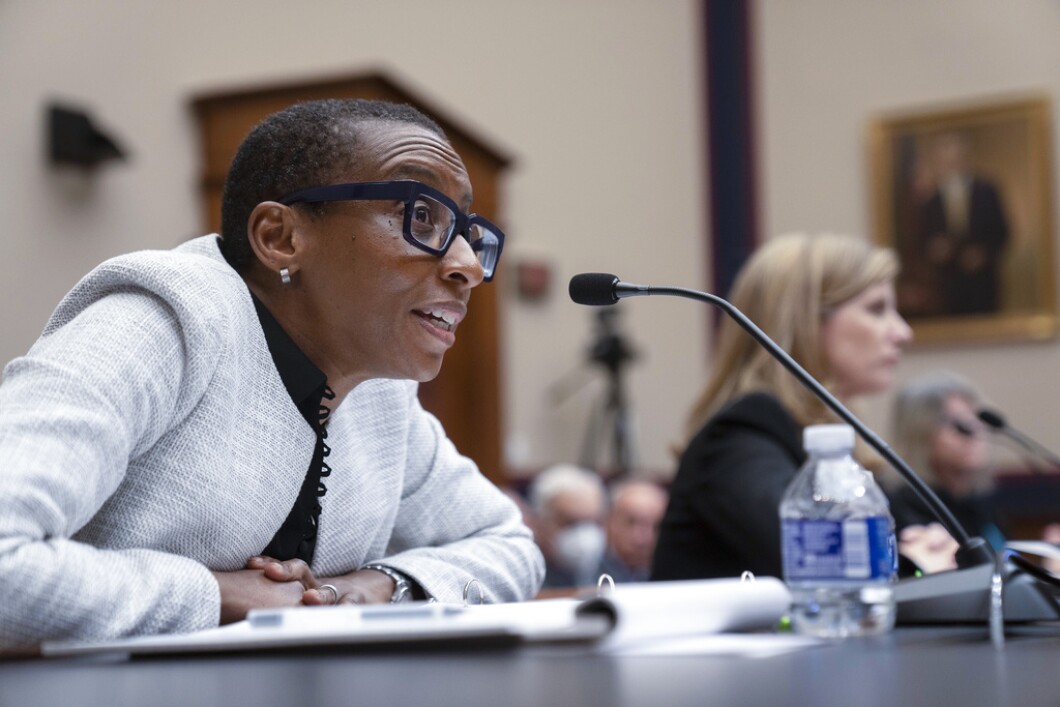
The president of Harvard University refused to say whether calls for the genocide of Jewish people violate the campus’s code of conduct during a congressional hearing Tuesday.
During an exchange with Rep. Elise Stefanik (R-NY), Harvard University President Claudine Gay repeatedly declined to say whether students who advocate the “genocide of Jews” would violate the school’s code of conduct but repeatedly said she found such speech “personally abhorrent.”
GOP SENATORS LOOK TO CRACK DOWN ON FOREIGN ESPIONAGE WITH TOUGHER REPORTING REQUIREMENTS
The exchange took place Tuesday during a House Education and Workforce Committee hearing on the rise of antisemitism on college campuses. Testifying alongside Gay was University of Pennsylvania President Elizabeth Magill and Massachusetts Institute of Technology President Sally Kornbluth.

Antisemitic incidents on college campuses have increased substantially since Oct. 7, when Hamas terrorists launched a series of attacks against Israel that claimed more than 1,200 lives. Student groups on college campuses, such as Students for Justice in Palestine, have repeatedly held protests and issued statements supportive of the attacks and of Hamas while accusing Israel of genocide.
Stefanik, a Harvard alum who has called for Gay’s resignation, began her line of questioning by asking the Harvard president if she was familiar with the term “intifada” and its association with the elimination of the state of Israel and Jews. Gay responded that she was familiar with it and knew that she had “heard that thoughtless, reckless, and hateful language” on Harvard’s campus.
Stefanik then asked Gay if she understood that “this call for intifada is to commit genocide against the Jewish people in Israel and globally,” to which Gay replied that “that type of hateful speech is personally abhorrent to me.”
The congresswoman from New York then repeatedly pressed Gay as to whether calling for an “intifada” violated Harvard’s code of conduct, to which Gay responded by invoking the institution’s commitment to freedom of expression.
“We embrace a commitment to free expression and give a wide berth to free expression, even of views that are objectionable, outrageous, and offensive,” Gay said after Stefanik asked a third time.
The exchange was perhaps the most heated moment during the more than three-hour hearing, which also featured testimony from Pamela Nadell, a professor of Jewish studies at American University. Lawmakers from both parties repeatedly shared accounts of Jewish students living in fear on their college campuses amid the rise in antisemitism. Meanwhile, Republican lawmakers raised concerns that the institutional culture of the three universities had created the conditions for the spike in antisemitic activity.
Throughout the hearing, Republicans repeatedly brought up the fact that Harvard had placed dead last in the Foundation of Individual Rights and Expression’s free speech ranking. The GOP lawmakers noted that barely 1% of the school’s faculty supported then-President Donald Trump in the 2020 election as proof of ideological uniformity at the institution.
“Institutional antisemitism and hate are among the poisoned fruits of your institutions’ cultures,” Committee Chairwoman Virginia Foxx (R-NC) said in her opening statement. “The buck for what has happened must stop on the president’s desk, along with the responsibility for making ‘Never Again’ true on campus.”
CLICK HERE TO READ MORE FROM THE WASHINGTON EXAMINER
Committee Democrats pointed to the Biden administration’s efforts to combat antisemitism and criticized Republicans for proposing budget cuts to the Department of Education’s Office for Civil Rights.
“While my colleagues claim to be committed to combating discrimination on campus, they are also contradictorily and simultaneously stoking culture wars that can be divisive and discriminatory,” Rep. Bobby Scott (D-VA), the committee’s top Democrat, said in his opening statement. “Moreover, House Republicans are proposing significant cuts to the Department of Education’s Office of Civil Rights, the very office responsible for upholding students’ civil rights and investigating discrimination claims.”






